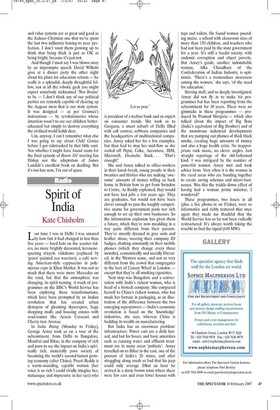Spirit of India
Kate Chisholm T,ast time I was in Delhi I was amazed by how fast it had changed in less than five years — hard hats on the scooter-riders, no more brightly decorated, kerosenespurting tricycle rickshaws (replaced by 'green'-painted eco warriors), a café serving American-style cappuccino in polystyrene cups in Khan Market. It was not so much that there were more Mercedes on the road, but that the atmosphere was changing, its spirit turning. A week of programmes on the BBC's World Service has been exploring these transformations, which have been prompted by an Indian revolution that has created urban dystopias of gleaming skyscrapers, huge shopping malls and housing estates with road-names like Acacia Crescent and Cherry-tree Avenue.
In India Rising (Monday to Friday), George Arney took us on a tour of the subcontinent, from Delhi to Bangalore, Mumbai and Bihar, in the company of rich and poor to see the impact on India's spiritually rich, materially poor society of becoming the world's second-fastest growing economy (after China). Preeti Reddy is a warm-sounding, capable woman (her voice is so rich I could vividly imagine her, statuesque and impressive in her sari) who www.spectator.co.uk is president of a techno bank and an expert on consumer trends. She took us to Gurgaon, a smart suburb of Delhi filled with call centres, software companies and the headquarters of multinational companies. Arney asked her for a few examples, but then had to stop her mid-flow as she reeled off Pepsi, Coke, Accenture, IBM, Microsoft, Deutsche Bank. . . 'That's enough!'
She and Arney talked to office-workers in their lunch-break, young people in their twenties and thirties who are making 'awesome' amounts of money telling us back home in Britain how to get from Swindon to Crewe. As Reddy explained, they would not have had jobs a few years ago. They are graduates, but would not have been clever enough to pass the toughly competitive exams for government posts nor rich enough to set up their own businesses. So the information explosion has given them a future, which they're now moulding in a way quite different from their parents. They're smartly dressed in grey suits and leather shoes, wearing their company ID badges, chatting constantly on their mobile phones (which they change every three months), economically and socially liberated, in the Western sense, and not so very different from the crowd that congregates in the bars of Canary Wharf in London — except that they're all smoking cigarettes.
Next stop was Bangalore and a conversation with India's richest woman, who is head of a biotech company. She compared herself to China's richest woman, who has made her fortune in packaging, as an illustration of the difference between the two emerging superpowers — India's economic revolution is based on the 'knowledge' industries, she says, whereas China is building its wealth on manufacturing.
But India has an enormous problem: infrastructure. Power cuts are a daily hazard, and last for hours; and basic amenities such as running water and effluent treatment are in many areas 'pathetic'. Arney travelled on to Bihar in the east, one of the poorest of India's 28 states, and after struggling along roads so bad that his jeep could only average 20km an hour he arrived in a dusty brown town where there were few cars and even fewer houses with taps and toilets. He found women pounding maize, a school with classroom sizes of more than 150 children, and teachers who had not been paid by the state government for a year. It's still a feudal society, with endemic corruption and abject poverty. But Arney's guide, another indomitable woman, Alka Chaudhary of the Confederation of Indian Industry, is optimistic. 'There's a tremendous awareness among the women,' she says, 'of the need for education.'
Stirring stuff, and so deeply investigated. Arney did not fly in to make his programmes but has been reporting from the subcontinent for 30 years. There were no gimmicks in these programmes — produced by Pramod Morj aria — which also talked about the impact of Big Boss (India's equivalent of Big Brother) and of the monstrous industrial developments that are pumping out plumes of thick black smoke, creating huge amounts of money and also a huge health crisis. No inappropriate rock music, no clever angles. Just straight reportage of the old-fashioned kind. I was intrigued by the number of powerful women Arney met and took advice from. Very often it is the women in the rural areas who are banding together to create saving schemes and micro-businesses. Was this the trickle-down effect of having had a woman prime minister, I wondered?
These programmes, two hours in all (plus a live phone-in on Friday), were so informative and richly textured that once again they made me thankful that the World Service has so far not been radically restructured. It's always worth taking the trouble to find the signal (648 MW).













































 Previous page
Previous page